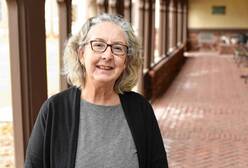 By Rev. Dr. Molly Scherm One of the beauties of scripture is that its stories touch on the fundamental themes of our lives, inviting us to reflect on those themes, and as we return to the stories again and again, we are always bringing something new that speaks to and through the words of scripture. Today we’ve heard a healing story from John’s gospel. Healing is a frequent motif in scripture, and healing was certainly a central part of Jesus’ ministry. The act of healing and the promise of healing are always going to be compelling for us because we are always aware of the need of healing in the world.
Most of the healing stories in the gospels, on their face, are about physical healing from bodily infirmities. The woundedness that feels most burdensome in the world today – to me at least – is more the psychological, emotional, and spiritual suffering, some of inherited and passed down throughout generations, that comes from the traumas of humans’ inhumanity to one another –
Perhaps what today’s gospel story offers us is the opportunity to think about what we know of healing. It’s a story of Jesus healing of a disabled man at a sacred pool in Jerusalem. Beth-Zatha, at the Sheep Gate into the city, was known to have healing powers, and was a gathering place for those seeking to be made well. It was believed that angels would stir up the water of the pool, and that entry into the water after this agitation occurred would optimize the healing effects. The man in today’s story - John doesn’t tell us exactly what was wrong with him – had been ill for 38 years. Because of his mobility issues, he told Jesus, when the waters were stirred up, he was never quite able to get to the pool before others got there ahead of him, absorbing the new infusion of healing power in the water before he could get there. Jesus, knowing in the power of God, instructed the man to ”Stand up, take your mat and walk,” and he did so. While the core truth, here, that God’s grace has the power to restore wellbeing is as important for us as it was for John’s hearers at the time his gospel was written, I find myself impatient with the simplicity of the gospels’ healing stories. Healing never simple. For example, I wonder about what comes after the healing at Beth Zatha:
We need healing – restoration of wholeness and wellbeing - whenever we suffer injury, illness, trauma, or loss, and the suffering involved in any trauma is complicated, and healing is always a process. It always takes time; it always has many aspects. Here is some of what we know about healing from the wise ones – both scientific and spiritual wise ones:
Am I safe? There is a powerful truth in the images of the post-resurrection Jesus, who, even as he returns to comfort his disciples, still bears the wounds of crucifixion in his body. So where do we find God, where do we find God’s love in the experience of healing, however complex, however drawn out?
So I don’t assume that man healed at the pool at Beth Zatha went home to live a simple happily-ever-after, but I do believe his life was opened by God’s healing Spirit, and that through that Spirit we can hope that he moved, with ups and downs, toward a life of generosity, compassion, and hope. Much of my thinking about healing this week has been impacted by an online seminar (provided by the Diocese) that Di Kurkulonis and I took part in. The presenters were an elder from the Ute tribe in Whiterocks, Utah and the priest of his parish, together reflecting on how the traditions of native cultures might inform us about generous living.* Elder Forrest and Father Michael set their remarks in the context of the trauma that has taken place for the Ute and other indigenous peoples of North America, as native communities were repeatedly forced off of the lands to which the people had been in relationship, as the dominant culture appropriated the land for ourselves and our own purposes. Despite these grievous injustices and the spiritual injury their community has suffered, the congregation Forrest and Michael described has done much healing. In their presentation Forrest and Michael emphasized two practices that they recommend for promoting healing. Neither is surprising or new; both are worth mention. The first is that of practicing gratitude. Paying attention to the small details of our lives and being thankful helps us to live in the present, and in appreciation that our lives are gifts from the Creator. Forrest and Michael also spoke powerfully about the importance of direct experience of the natural world – the air, the water, the earth and our sibling plant and animal creatures through which we meet God. Let’s listen to this wisdom. May the angels stir up the waters for us, and may we immerse ourselves and find the path of healing.
Comments are closed.
|
We are blessed to have a diversity of preaching voices in our parish. Our guild of preachers is a mixture of lay and clergy. We hope you enjoy the varied voices. Meet our Preachers
All
Archives
July 2024
|